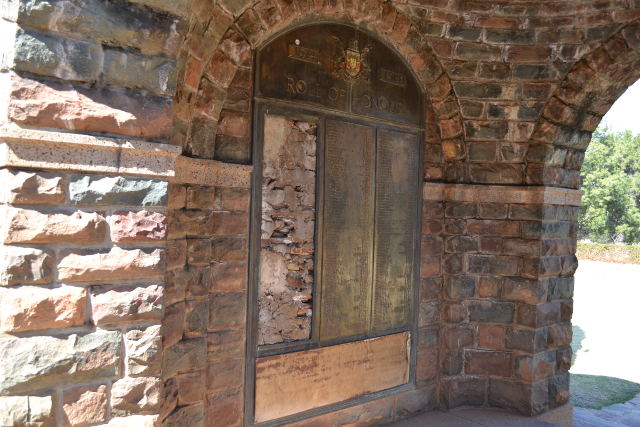Just days before Christmas, the lives of critical patients were placed on the line after the provision of oxygen was interrupted at the Kimberley Hospital when copper thieves closed in on the facilities, the Diamond Field Advertiser (DFA), a local South African newspaper reported.
The oxygen pipes were disconnected, stolen and infrastructure vandalised at the state hospital in the mining town of Kimberley. The pipes of the tanks were severed on Thursday while critical surgeries were being performed.
Specialist doctors were operating on an eight-year-old child when the oxygen supply to the patients suddenly dropped. Emergency oxygen cylinders had to be hastily brought into the theatre to finalise the procedure. A delicate operation on a spinal patient was similarly disrupted by the robbery.
Medical staff told DFA that the lives of all the neonatal patients connected to life-support machines and patients in the intensive care unit were put at risk during the incident.
When FWM contacted both the Kimberley State Hospital and an annex also in the town for comment, staff told us that they were prohibited from speaking to the media because the first story had leaked to the press. The media liaison officer could not be reached, despite many attempts.
A nurse from the medical staff at the paediatric ward of the hospital, who would not give her name, only told FMW that there were no fatalities, but would not comment on specific details regarding the incident.
It appears that no-one was seen tampering with the pipes, despite a security company’s presence. Oxygen from the main cylinder, which is connected to an Oxyntaka tank, had to be temporarily patched as gas then leaked from the vandalised pipes.
Spokesman for the Ministry of Health, Lebogang Majaha, has confirmed that services at the Kimberley Hospital had been interrupted as a result of copper-pipe theft.
“At this stage investigations are still continuing. We have beefed up security and we can report that the pipe has been repaired and services are running as normal.” He said that the hospital was in the process of procuring additional and replacement oxygen cylinders.
Copper theft is a daily occurrence in South Africa. It is estimated that the country loses over R5 billion (360 million euros) annually due to cable theft, the state broadcaster, the SABC, said recently.
Power utility, Eskom, has warned those who continue to damage its infrastructure and steal copper cables, that they will be met with the full might of the law, but law enforcement is notoriously ineffective and corrupt. While the ANC regime endlessly rattles on about “rights” including the right to life and health care as well as “redressing the wrongs of the past”, it is mostly ideological hot air.
The Criminal Matters Amendment Act, which promised harsher jail sentences and stricter bail conditions for people who damage infrastructure related to transport, power, water and communications, turned out to be yet more political puff.
The South African Chamber of Commerce and Industry’s (SACCI) acting CEO, Peggy Drodskie, announced last year that the Copper Theft Barometer level had increased.
Drodskie said: “Bearing in mind that the South African Chamber of Commerce and Industry Copper Theft Barometer is based only on theft from Eskom, Telkom and Transnet, and considering that it comprises only the cost of replacing the metal; this figure is but a drop in the ocean when the impact on the economy is taken into account.”
Drodskie said recent estimates put the loss to the country’s economy between R5 billion and R7 billion per year.
A SACCI communications officer confirmed the figure but added that it was a drop in the ocean when taking into account the impact on the economy, Kempton Express, a local newspaper reported at the time.
The spokesperson said the copper-theft volume indicator increased to 179 metric tonnes in April 2015 from 173 metric tonnes in March 2015, in just one month, but could not explain the rise. “It was not clear whether the upward trend is due to greater demand, an increase in the price during the past months or to more lax implementation and policing of the Second Hand Goods Act, in spite of copper theft being designated a high-priority crime,” the spokesperson concluded.
But Drodskie was more forthright, stating that South African exports of waste copper products had increased significantly to $7,2-million in March from $3,4-million in January and $7-million in August 2014.
This, she said, was worrying as “South Africa has only two percent of the global copper reserves, but now has the reputation of being the largest exporter of copper to China and India. There is thus a disconnect between the amount of copper mined and that being exported.”
It is not the first time that hospitals are targeted either. Copper piping was stolen from the water reservoir above the seventh floor of New Somerset Hospital in Green Point, Cape Town some years ago which resulted in the flooding of the hospital’s four main lifts and basement. The main outlet pipe was removed which led to large volumes of water flooding the hospital’s lifts and basement with up to three metres of water.
The City of Cape Town’s fire brigade managed to pump the basement water to a level that no longer threatened the electrical supply of the hospital. Water was also pumped out of the lift shafts but due to the amount of water that had entered the shafts, patients had to make use of the stairs.
Diverting patients from New Somerset Hospital would have placed additional pressure on neighbouring hospitals already suffering from government ineptitude. The hospital instead activated an emergency action plan to manage the patient load.
Wards had to open in other blocks of the hospital for patients unable to use the stairs to be relocated to while all elective surgeries had to be postponed.
Generally most South African state clinics and hospitals have failed to meet even the most basic healthcare standards since the end of white rule. The damning findings in a report by healthcare-compliance watchdog the Office of Health Standards Compliance released in May this year, found that just 2 percent of the country’s healthcare facilities were adequate despite the vast sums of tax money poured into healthcare by the ANC regime.
Between 2012 and March 2016 the OHSC conducted 1887 inspections at 1500 healthcare facilities across South Africa, and the findings in the black provinces, the Eastern Cape, Limpopo, Mpumalanga and Northern Cape were particularly dismal. Some 35 percent returned results of 39 percent or lower, with facilities being labelled “critically noncompliant”.
And copper theft has added another layer of difficulty to the provision of care. In 2007, six armed men were caught trying to steal copper pipes used to carry oxygen to patients at a Port Elizabeth hospital, the Eastern Cape health department confirmed. The incident happened at 4am at the Dora Nginza Hospital.
“When they were caught they threatened to shoot our security personnel and we had to call police. Four were arrested and two managed to escape.”
No patients were affected as the pipes were still intact, but this was the third copper theft at the hospital. Pipes were stolen in December 2005 and again in December 2006 when two hospital workers were caught red-handed and suspended.
A parliamentary opposition party found in March 2015 that the Pelonomi Hospital in Bloemfontein was “a medical catastrophe”. A visit there revealed that there was no access control. Nurses were raped at the hospital some years ago, but nothing has been done to improve security. Not only were outside oxygen tanks not properly secured, but entrances to where generators were housed, were not properly locked.
SACCI has meanwhile strongly questioned the effectiveness of the current legislation. It wants to determine not only whether the provisions are adequate, but also whether or not the fact that copper theft has been designated a ” high-priority crime” is being fully recognised by law-enforcement and justice authorities.
Roy Robertson, a former Lieutenant Colonel in the SAPS and principal director at CPI, a corporate investigation firm based in Midrand, Johannesburg, which specialises in the investigation of non-ferrous metal theft, says the theft of ferrous and non-ferrous metals, particularly copper, has “increased drastically in recent times”.
A kilogram of copper will fetch about R70. “But the syndicates are the real threat,” Robertson warns. “There are well-organised criminal syndicates operating throughout South Africa that are crippling this country’s economy. These syndicates have international links and influence — and this includes disturbing relationships with unscrupulous scrap-metal dealers and exporters.”
The end result of research conducted by William Pretorius, a criminology student at UNISA, indicates that copper-cable theft crimes seem to be out of control, and costing the country and its citizens dearly.
An overall consensus exits that copper-cable theft can be successfully mitigated if all the copper victims collaborate by sharing resources and intelligence. The requirement to make this collaboration successful is leadership, non-existent in South Africa.
As a recent victim of copper theft explains: “We are massively frustrated to once again fall victim to this sort of crime. The problem of cable theft in South Africa is far bigger than just Gauteng, it is a national scourge tantamount to economic sabotage,‟ the spokeswoman for the Bombela Concession Company, which operates the Gautrain, told Pretorius.
FWM spoke to a family in Johannesburg that had had many harrowing experiences as a result of copper cable theft, and were left stranded without internet and telephone land lines for long periods of time.
The Van Jaarsveld family eventually gave up on reporting the theft because the thieves, even when caught red-handed, threatened them while the police did nothing to intervene.
Copper thieves had dug up their telephone cables countless times, but in the end the state utility Telkom stopped replacing the cables, citing rising costs.

















